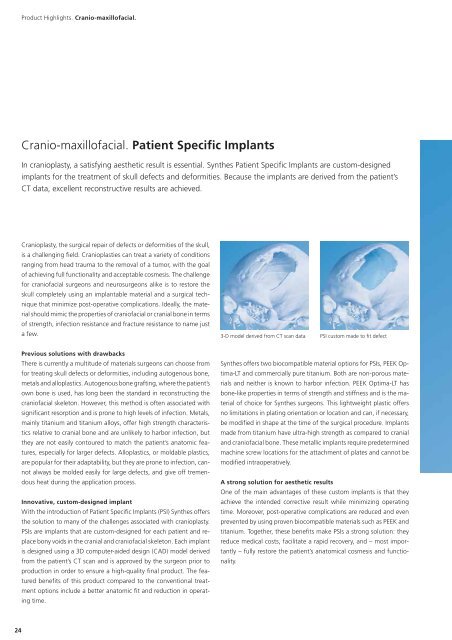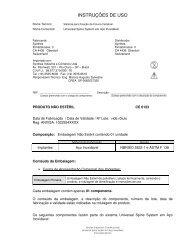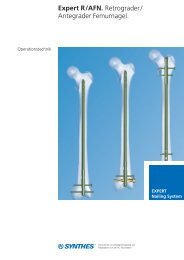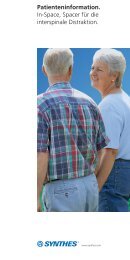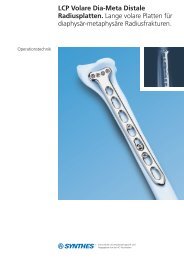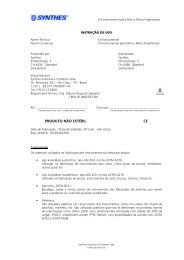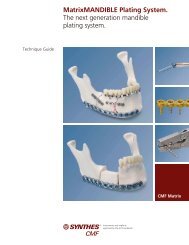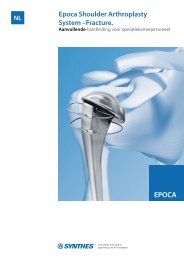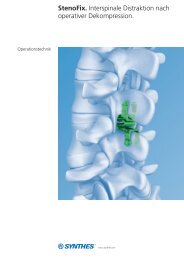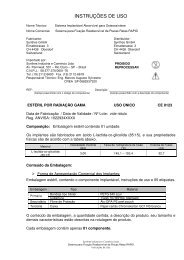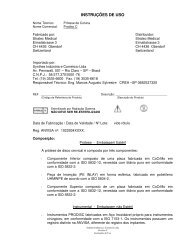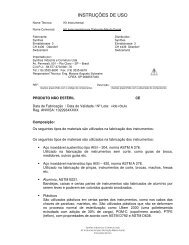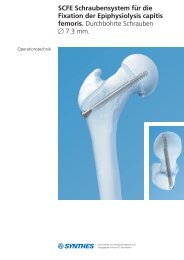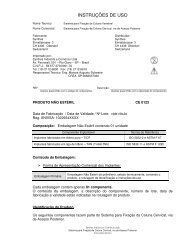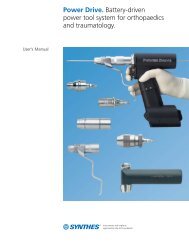Create successful ePaper yourself
Turn your PDF publications into a flip-book with our unique Google optimized e-Paper software.
Product Highlights. Cranio-maxillofacial.<br />
Cranio-maxillofacial. Patient Specific Implants<br />
In cranioplasty, a satisfying aesthetic result is essential. <strong>Synthes</strong> Patient Specific Implants are custom-designed<br />
implants for the treatment of skull defects and deformities. Because the implants are derived from the patient’s<br />
CT data, excellent reconstructive results are achieved.<br />
Cranioplasty, the surgical repair of defects or deformities of the skull,<br />
is a challenging field. Cranioplasties can treat a variety of conditions<br />
ranging from head trauma to the removal of a tumor, with the goal<br />
of achieving full functionality and acceptable cosmesis. The challenge<br />
for craniofacial surgeons and neurosurgeons alike is to restore the<br />
skull completely using an implantable material and a surgical technique<br />
that minimize post-operative complications. Ideally, the material<br />
should mimic the properties of craniofacial or cranial bone in terms<br />
of strength, infection resistance and fracture resistance to name just<br />
a few.<br />
3-D model derived from CT scan data PSI custom made to fit defect<br />
Previous solutions with drawbacks<br />
There is currently a multitude of materials surgeons can choose from<br />
for treating skull defects or deformities, including autogenous bone,<br />
metals and alloplastics. Autogenous bone grafting, where the patient’s<br />
own bone is used, has long been the standard in reconstructing the<br />
craniofacial skeleton. However, this method is often associated with<br />
significant resorption and is prone to high levels of infection. Metals,<br />
mainly titanium and titanium alloys, offer high strength characteristics<br />
relative to cranial bone and are unlikely to harbor infection, but<br />
they are not easily contoured to match the patient’s anatomic features,<br />
especially for larger defects. Alloplastics, or moldable plastics,<br />
are popular for their adaptability, but they are prone to infection, cannot<br />
always be molded easily for large defects, and give off tremendous<br />
heat during the application process.<br />
Innovative, custom-designed implant<br />
With the introduction of Patient Specific Implants (PSI) <strong>Synthes</strong> offers<br />
the solution to many of the challenges associated with cranioplasty.<br />
PSIs are implants that are custom-designed for each patient and replace<br />
bony voids in the cranial and craniofacial skeleton. Each implant<br />
is designed using a 3D computer-aided design (CAD) model derived<br />
from the patient’s CT scan and is approved by the surgeon prior to<br />
production in order to ensure a high-quality final product. The featured<br />
benefits of this product compared to the conventional treatment<br />
options include a better anatomic fit and reduction in operating<br />
time.<br />
<strong>Synthes</strong> offers two biocompatible material options for PSIs, PEEK Optima-LT<br />
and commercially pure titanium. Both are non-porous materials<br />
and neither is known to harbor infection. PEEK Optima-LT has<br />
bone-like properties in terms of strength and stiffness and is the material<br />
of choice for <strong>Synthes</strong> surgeons. This lightweight plastic offers<br />
no limitations in plating orientation or location and can, if necessary,<br />
be modified in shape at the time of the surgical procedure. Implants<br />
made from titanium have ultra-high strength as compared to cranial<br />
and craniofacial bone. These metallic implants require predetermined<br />
machine screw locations for the attachment of plates and cannot be<br />
modified intraoperatively.<br />
A strong solution for aesthetic results<br />
One of the main advantages of these custom implants is that they<br />
achieve the intended corrective result while minimizing operating<br />
time. Moreover, post-operative complications are reduced and even<br />
prevented by using proven biocompatible materials such as PEEK and<br />
titanium. Together, these benefits make PSIs a strong solution: they<br />
reduce medical costs, facilitate a rapid recovery, and – most importantly<br />
– fully restore the patient’s anatomical cosmesis and functionality.<br />
24


